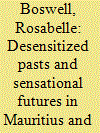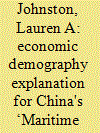|
|
|
Sort Order |
|
|
|
Items / Page
|
|
|
|
|
|
|
| Srl | Item |
| 1 |
ID:
164430


|
|
|
|
|
| Summary/Abstract |
Madagascar, Mauritius and Seychelles are at the center of industrial tuna extraction in the Southwest Indian Ocean (SWIO). In this paper, we show that, while a discourse of regionalism between the three islands is prominent, the possibilities of regionalism face deep challenges in relation to the tuna industry. This is due to three factors. First, local perceptions, especially amongst those working in and on the tuna industry, are in disconnection with an ‘Indianoceania’ vision. Second, the geopolitics between coastal states and distant water fishing nations creates various entanglements including through fishing access revenue and foreign aid. Finally, the materiality of tuna can at times create competition as countries seek to individually maximize benefits from the industry. We argue that the active reinforcement of regional identity and collaboration around this resource is necessary to sustain local benefits into the future.
|
|
|
|
|
|
|
|
|
|
|
|
|
|
|
|
| 2 |
ID:
164428


|
|
|
|
|
| Summary/Abstract |
This paper seeks to assert the relevance of ‘sensing’ identity in social analyses of the Southwest Indian Ocean islands. It is proposed that for some time, a broad concept of social change (specifically creolization) has been the reference point for understanding identity in the region. However, authors have tended to ignore the sensorial nature of human identity and the sensory experience of slavery and colonization. As a result, they have advanced a ‘sense’ less articulation of the islands and their inhabitants. Focusing on the senses in human identity and social experience, this article offers a sense-rich analysis of identity in the Southwest Indian Ocean region, revealing multidimensional senses of self in a diversity of social spaces. The author concludes that by fixating on historical dates, broad social processes and the interests of a largely patriarchal society, some scholars have desensitized the past, obfuscating the realities of and creativity emerging out of slavery and colonization. Sensorial analyses of identity in the Southwest Indian Ocean region open up new avenues for thinking about human/nature relations and politics, the nature of ‘culture’ and experiences of social change.
|
|
|
|
|
|
|
|
|
|
|
|
|
|
|
|
| 3 |
ID:
164432


|
|
|
|
|
| Summary/Abstract |
For four decades, China has gradually re-shaped the distribution of global economic activity, underpinned by a low-wage demographic dividend era. For around a decade, however, both demographic and economic structural change, at home and abroad, have incrementally shifted China's comparative advantage away from low-wage industrialisation. In response, China now seeks to become an international investor in these industries under the umbrella of the country's flagship Belt and Road Initiative. That set of changes, in turn, offers a new context of opportunity for developing countries, and especially so for Indian Ocean (IO) countries that are strategically placed along a continental coastline and in the early phase of a process of demographic transition. This explains the economic demography imperative underlying China's twenty-first-century interest to deepen economic ties with IO countries under the umbrella of the 'Maritime Silk Road of the twenty-first century' initiative.
|
|
|
|
|
|
|
|
|
|
|
|
|
|
|
|
| 4 |
ID:
164429


|
|
|
|
|
| Summary/Abstract |
Southwest Indian Ocean (SWIO) islands rely extensively on imported fossil energy to fuel their economic and social activities. This dependency coupled with energy price volatility and possible supply chain disruptions further threaten their sustainable energy future. The concept of energy vulnerability is used as a framework to assess the extent to which SWIO islands are vulnerable to adverse events by means of a composite index of energy vulnerability. It is expressed as the geometric mean of five sub-indicators: access to energy, energy import dependency, primary energy mix diversity, primary energy intensity of gross domestic product (GDP) and energy bill. Energy performances vary across SWIO islands and dimensions contributing the most to energy vulnerability are analyzed. The energy vulnerability index can be used by policy-makers as a benchmarking tool in ‘under-performing’ islands to duplicate best practices and accelerate energy transition in the region.
|
|
|
|
|
|
|
|
|
|
|
|
|
|
|
|
| 5 |
ID:
164431


|
|
|
|
|
| Summary/Abstract |
Exporters, in developing countries, often struggle to access accurate market information which will help them make informed decisions about which export markets and products to focus on. Despite the existence of several market selection techniques, a lack of market information has been identified as a major impediment to export activity in the Indian Ocean Rim region. This paper introduces the TRADE-DSM®, a scientific market selection methodology that screens large quantities of data to reveal the most promising realistic export opportunities for a company, industry, country or region. The hypothesis of this paper is two-fold: (i) whether the TRADE-DSM® could help fill the information gap that exporters and export promotion organizations in the Indian Ocean Rim Association (IORA) experience, and (ii) whether the TRADE-DSM® could provide the building blocks for the development of a region-wide export promotion strategy for IORA.
|
|
|
|
|
|
|
|
|
|
|
|
|
|
|
|
| 6 |
ID:
164427


|
|
|
|
|
| Summary/Abstract |
This paper reassesses the historical connections linking Seychelles and Reunion Island from the 1770s to the 1900s. It highlights the contributions of Reunion people in the early development of Seychelles as a case of mutual self-interest cooperation rooted in history. Reunionese migrated to Seychelles during the French period, which lasted from 1770 to the 1810s. In addition to their contribution to the settlement of the then uninhabited archipelago, Reunion people introduced new crops. Despite the parceling out of these two island societies between the British and French empires in 1815, no complete interruption occurred. In the second half of the nineteenth century, Reunion’s impact on Seychelles society evolved to more specialized areas. As such, the story constitutes a valuable and instructive chapter in trans-imperial and inter-colonial cooperation within the Indian Ocean. Ultimately, the promotion of this shared heritage is an asset for regional cooperation today in various ways.
|
|
|
|
|
|
|
|
|
|
|
|
|
|
|
|
| 7 |
ID:
164426


|
|
|
|
|
| Summary/Abstract |
The Southwest Indian Ocean is characterized by the presence of several islands of different size, culture, socio-economic context and political status. Together, they form an original island region that comprised four island states as well as a certain number of non-sovereign territories (see Figure 1 and Table 1). If the island states are easy to identify (Comoros, Madagascar, Mauritius and Seychelles), the list of the island territories is subject to debate and varies according to different geographical and political postures and interpretations. In what can be considered as the most common approach, this list includes non-sovereign island territories that are actually subject to territorial disputes between France or the United Kingdom and three of the regional island states, namely Mayotte1
1. Actually controlled by France as a French overseas department and region, claimed by the French Republic and the Union of the Comoros.
View all notes
, the Scattered Islands2
2. Actually controlled by France as one of the five districts constituting the French Southern and Antarctic Lands. Bassas da India, Europa, Glorioso Islands and Juan de Nova are claimed by the French Republic and the Republic of Madagascar. Comoros has also shown interest for the Glorioso Islands. Tromelin is claimed by the French Republic and the Republic of Mauritius.
View all notes
, and the Chagos Archipelago3
3. Actually controlled by the United Kingdom (UK) as the British Indian Ocean Territory (BIOT), the Chagos Archipelago is claimed by Mauritius and the United Kingdom.
View all notes
, as well as Reunion over which French sovereignty is not contested by its island states neighbors. A broader geographical approach adds the coastal islands of the African continental states of Kenya, Mozambique and Tanzania, especially the Zanzibar Archipelago which is a semi-autonomous region of the United Republic of Tanzania.
|
|
|
|
|
|
|
|
|
|
|
|
|
|
|
|
|
|
|
|
|